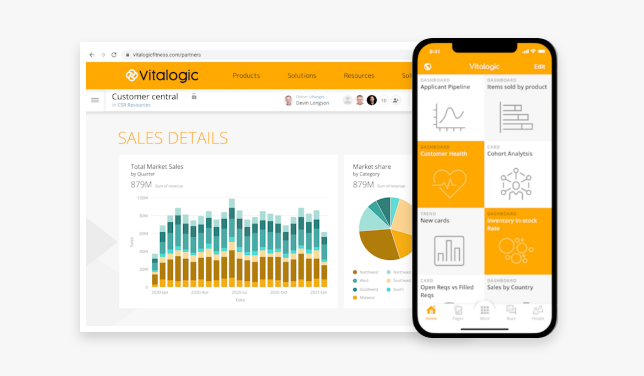How embedded analytics can benefit your business
What is embedded analytics?
The incorporation of data analytics reports into third-party software, websites, and apps is known as embedded analytics. The dashboard from a business intelligence (BI) tool is embedded and displayed on some other software or website, allowing the insights to be shared and used directly from the main source without having to navigate to another application.
Embedded analytics enables you to see improvements in real time. As data gets processed and insights are developed, embedded visualizations should change as well. News portals, research platforms, public health reporting websites, and other embedded analytics use cases need visualizations that are constantly up-to-date.
A dashboard is an excellent way to communicate data to management and end-users. Whether it’s the sales team, marketing team, accounts department, or production staff, every department of a company can benefit from embedded analytics to make better decisions at work. It’s a practical way to implement the model of data-driven business.

Embedded analytics and business intelligence: what’s the relationship?
By fully integrating business intelligence tools and insights into the system, embedded analytics solutions are more responsive and effective. Embedded analytics helps you to continually comprehend data rather than obtaining insights periodically from visualizations confined to a separate framework.
How to make use of embedded analytics
There are many approaches to employing embedded analytics both inside and outside the organization to provide data insights to users. Here are just a few:
Internal tools
Embedded analytics software is being used to simplify operations in many departments and connect them to accomplish specific objectives. Various teams across the organization can get the data they need for their projects and then use the insights directly to design better plans by merging embedded analytics with these platforms.
Website integration
Often, organizations will want to embed analytics into their website so that potential customers who visit are drawn in. Most web development frameworks have the capability to embed content from outside sources. Using an embedded analytics application that has white-label features helps provide a consistent look and feel across your website.
Revenue driver
What if you really want to make money from embedded analytics? Simply market it as a premium feature. Interested parties can employ embedded analytics in their systems by paying for the premium functionality (either a one-time cost or monthly subscription).
Embedded analytics for business
Some of the benefits of embedded analytics include the following:
1. Make data-driven decisions
How can you quickly implement a data-driven culture across your organization? To achieve this goal, one option is to use embedded analytics. People understand how critical it is to follow a data-driven decision-making process that incorporates real-time, advanced analytics. It is possible to get all employees on board by having data insights easily accessible to everyone in the organization by embedding analytics.
2. Boost returns on data transformation investment
According to research, user acceptance of embedded analytics is higher than that of standard BI solutions without embedding capability. The return on investment (ROI) will rise as more people adopt it. Given how costly data transformation is, every company should strive for a higher adoption rate. You can optimize your resources and boost returns without making things difficult for your employees by incorporating embedded analytics.

3. Improve market competitiveness
Global brands, such as Amazon, have used integrated analytics in their online applications to great effect. Due to the consistent look and feel, many clients are unaware that embedded analytics are present. They do, however, expect the same type of experience from other brands and are dissatisfied when these other organizations don’t deliver. You can see how Amazon has gotten a leg up on the competition.
4. Increase operational effectiveness
Wouldn’t staff be able to work more efficiently if they had all of the data and insights they needed in one spot? Enterprises can use data insights and integrated analytics to empower their staff with business intelligence at their fingertips. With embedded analytics, they won’t need to sift through a mountain of data to discover valuable insights. There will be fewer disruptions to your workflow as employees make decisions based on sound insights.
5. Improve customer satisfaction
Services such as Netflix have been leveraging embedded analytics to retain and engage customers. Embedded analytics, of course, is combined with artificial intelligence, big data, and data science technologies to create a holistic setup that gives individualized recommendations to customers, hence improving customer happiness.
6. Make products stand out
Embedded analytics can help differentiate your products or services. As previously stated, providing comprehensive analytics via contextual embedding as a premium or high-end option would elevate your brand in the market by highlighting the items you offer.
Conclusion
Embedded analytics offers numerous benefits to your company by providing you and your customers with seamless visualizations and real-time insights. Embedded analytics will boost your organization from every angle, from optimizing systems to improving work culture by empowering people. The future of embedded analytics seems bright, especially as artificial intelligence (AI) becomes more prevalent. We’ll soon see it integrated into every corporate procedure.
Check out some related resources:

10 Qlik Alternatives & Competitors in 2025

Intro to Domo Workflows: Intelligently Automate Business Processes






